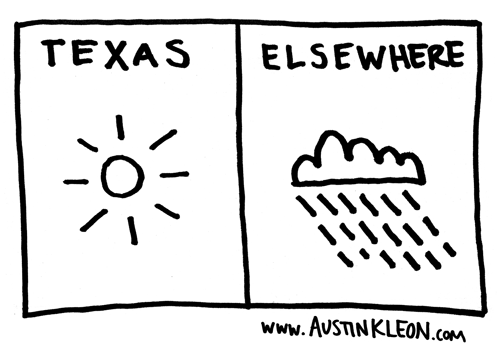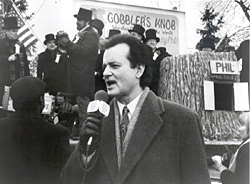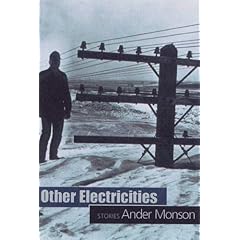
Texans are a lot like Catholics: it’s the converts who are the most fervent believers…

Texans are a lot like Catholics: it’s the converts who are the most fervent believers…
“Maybe it hadn’t been a community, but it had been a place. Now there weren’t any places left, just separate houses with separate televisions and separate telephones and less and less dropping by.”
– Toni Morrison, Sula

After watching GROUNDHOG DAY last week, I said to Meg, “Everybody talks about the religious implications of this film, but I wonder if anybody has written about the fact that this storyline could only happen inside the world of a small town?” I dug around, and sure enough, I found an essay by a film critic named Mario Sesti that beat me to the punch:
…the suspicion that behind the calm facade of small-town life hides an invisible presence or god…that may sooner or later make the place degenerate into horror has become a recurrent idea in American cinema….[Punxsutawney, Pennsylvania] is a carillon world, a universe in miniature, perfect and crazy, happy and diabolical-as if infinite repetition were the only form of eternity that our imagination knew how to represent….
Sesti goes on to describe how the character Phil Connors somehow becomes the author of his own story, as he maps the terrain of the place, gets to know his cast of characters.
A small stage, a set, a contained world in which all the characters are known, the geography is mapped, strangers come to town, and small changes are impossible not to notice: this is what the small town has to offer as a setting.
Sometimes I think it’s helpful to step back from the things you’re reading, the influences you’re absorbing, and have a look at what threads they have in common, and then try to figure out why they’re resonating with you and what it means. So much about life is timing, and sometimes things just magically gel together. Sometimes the link is really dumb and arbitrary, but ends up revealing something.
For instance, two of my favorite contemporary artists right now are both from the Midwest, work in short, almost sketchy forms, and are named some form of “Anders.”
 ANDERS NILSEN writes/draws comics. His stuff appears in MOME, D+Q, and his own series, BIG IDEAS. He has a new book coming out, called MONOLOGUES FOR THE COMING PLAGUE. Here is a nice long interview with him, in which he says:
ANDERS NILSEN writes/draws comics. His stuff appears in MOME, D+Q, and his own series, BIG IDEAS. He has a new book coming out, called MONOLOGUES FOR THE COMING PLAGUE. Here is a nice long interview with him, in which he says:
Why comics? I think when I went back to comics it was because, as a kid comics were the art form I identified with the most keenly. They say if you don’t know what to do with your life, try to remember what you loved most when you were twelve and do that.
When asked why so many cartoonists live in Chicago, he responded:
I really have no idea. It’s been suggested that comics may be in some way particularly suited to the Midwest, but I can’t quite recall the reasoning. Humility. A lot of time inside in the winter, might as well draw. The protestant work ethic. A distrust of/lack of entre into the bi-coastal Cultural Establishment. How do those sound? Comics is definitely not about impressing people. which I would say is a kind of midwestern characteristic. We tend to not be very impressive. All those skyscrapers downtown were built by East-coasters and Europeans.
* * *
 ANDER MONSON writes short stories and poems, teaches in Michigan, and edits THE DIAGRAM. His book of poems, VACATIONLAND, and his novel-in-short-stories, OTHER ELECTRICITIES, are about Michigan’s Upper Peninsula, where he grew up. A great interview with him is here.
ANDER MONSON writes short stories and poems, teaches in Michigan, and edits THE DIAGRAM. His book of poems, VACATIONLAND, and his novel-in-short-stories, OTHER ELECTRICITIES, are about Michigan’s Upper Peninsula, where he grew up. A great interview with him is here.
He has this to say about writing your home:
I can only think that the place in which you grow up has a significant effect on you. How can it not? Growing up in Michigan’s UP — with its history of boom and bust, of the rise and the fall of the mines, with its 6-month winters, and with the constant presence of tourism (the UP as a place in its way devoted to visitors, not to its residents) — has turned my work somehow. I’m interested in loneliness and in isolation, in the effects of living under extreme weather, and how those who choose to live there bear it. Of course they love it, or they wouldn’t live there (though many of them have no choice, have never gotten out). I’m gone from the place now, living ten hours away downstate, but even when I lived in Alabama, I thought of snow.
* * *
This site participates in the Amazon Affiliates program, the proceeds of which keep it free for anyone to read.